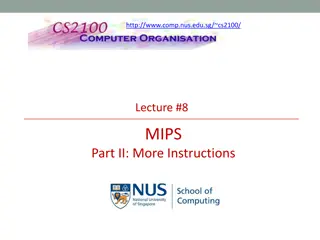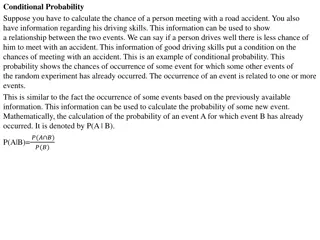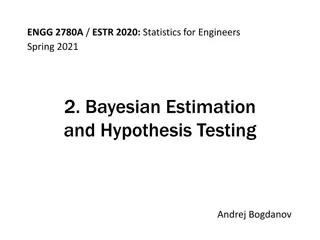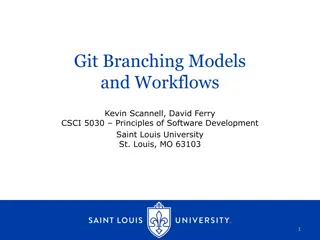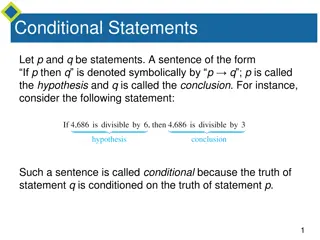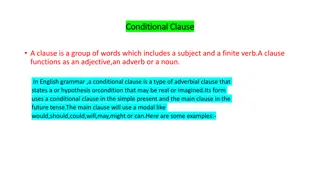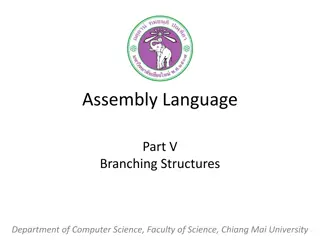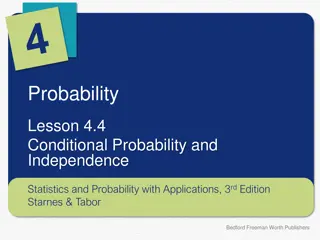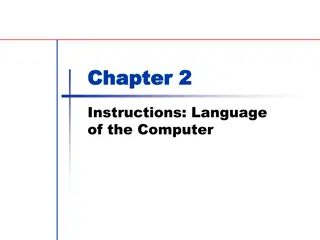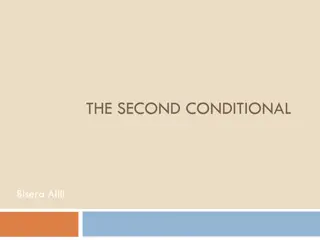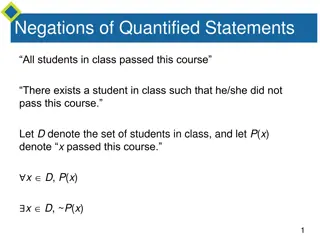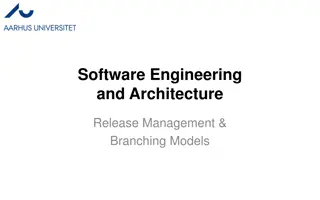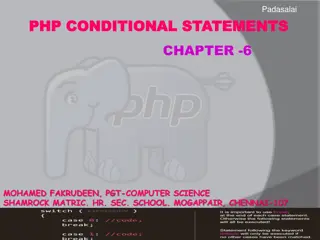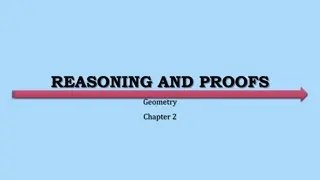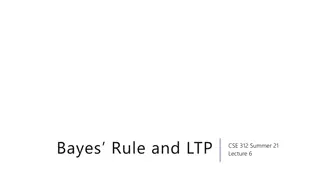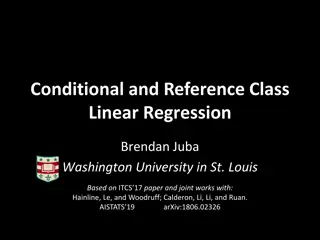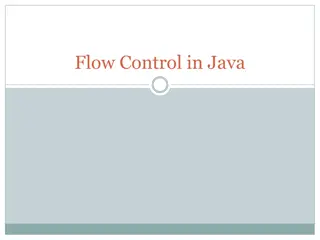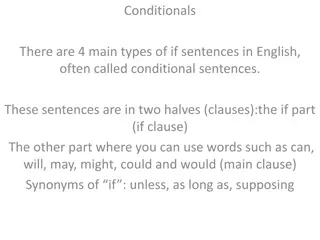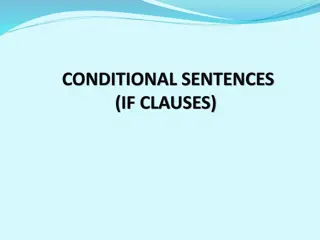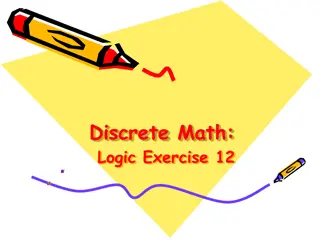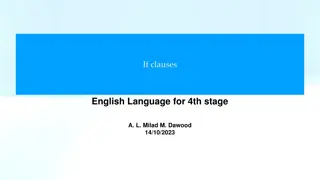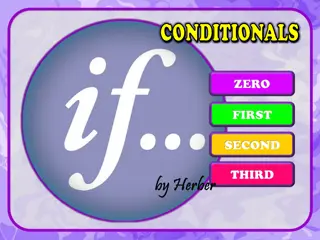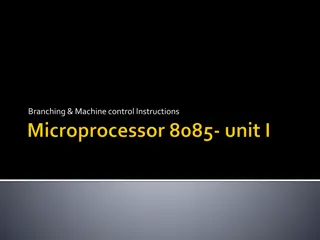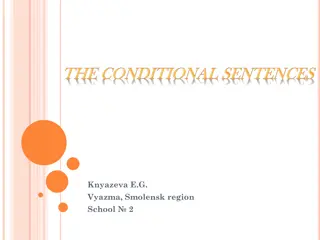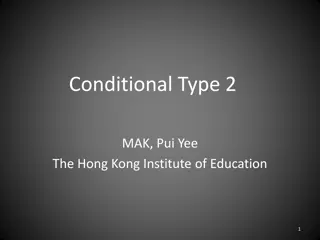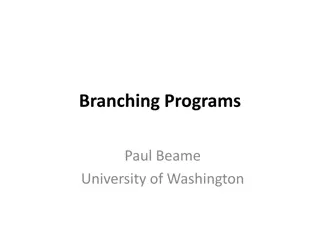Understanding Logical Form and Equivalence in Conditional Statements
Delve into the intricacies of logical form, equivalence, and compound statements in the realm of propositional logic. Explore valid and invalid arguments, conditional statements, and the logic of compound statements with puzzles to sharpen your logical reasoning skills. Unravel scenarios like determ
2 views • 81 slides
Understanding MIPS Part II: Memory Organization and Instructions
Explore the intricacies of Memory Organization in the context of MIPS architecture, covering topics such as Memory Transfer Unit, Word Alignment, Load and Store Instructions, Making Decisions with Conditional Branching and Unconditional Jumps, Loops, Arrays and practical exercises. Learn about the m
16 views • 43 slides
Understanding Conditional Probability and Bayes Theorem
Conditional probability relates the likelihood of an event to the occurrence of another event. Theorems such as the Multiplication Theorem and Bayes Theorem provide a framework to calculate probabilities based on prior information. Conditional probability is used to analyze scenarios like the relati
1 views • 5 slides
Bayesian Estimation and Hypothesis Testing in Statistics for Engineers
In this course on Bayesian Estimation and Hypothesis Testing for Engineers, various concepts such as point estimation, conditional expectation, Maximum a posteriori estimator, hypothesis testing, and error analysis are covered. Topics include turning conditional PDF/PMF estimates into one number, es
1 views • 16 slides
Mastering Excel: Filters, Conditional Formatting, and Data Validation
Learn how to use filters in Microsoft Excel to organize and display data efficiently. Discover the power of conditional formatting to automatically format cells based on specific criteria. Explore data validation to control and validate user input, ensuring accuracy and consistency in your worksheet
1 views • 18 slides
Git Branching Models and Workflows
Git branching models determine how code changes are managed and integrated in software development projects. This content discusses successful branching models, emphasizing the usage of master, develop, feature, release, and hotfix branches. It also explains why Git branching is different from centr
0 views • 13 slides
Understanding Conditional Statements in Logic
Conditional statements in logic involve connecting statements with an "if-then" structure. The truth of the conclusion is dependent on the truth of the hypothesis. Explore examples, truth tables, and logical equivalences to grasp the concepts of conditional statements.
0 views • 26 slides
Understanding Conditional Clauses in English Grammar
A conditional clause is a type of adverbial clause in English grammar that states a hypothesis or condition using a conditional clause in the simple present and the main clause in the future tense. This type of clause uses modal verbs like would, should, could, will, may, might, or can. Conditional
2 views • 6 slides
Understanding Branching Structures in Assembly Language
The content discusses branching structures in assembly language, focusing on conditional jumps, the CMP (compare) instruction, how the CPU implements conditional jumps, signed versus unsigned jumps, and using the JMP (jump) instruction for unconditional transfers of control. Examples and explanation
1 views • 24 slides
Understanding English Conditional Sentences
Explore the world of English conditional sentences, covering real conditions, unreal conditions in the present, and unreal conditions in the past. Learn about different types of conditions, their forms, and examples to grasp the concept thoroughly.
2 views • 24 slides
Understanding Conditional Probability and Independence in Statistics
Conditional probability and independence are essential concepts in statistics. This lesson covers how to find and interpret conditional probabilities using two-way tables, calculate probabilities using the conditional probability formula, and determine the independence of events. Through examples li
0 views • 15 slides
Understanding Computer Organization and Design: Chapter 2
This content discusses shift operations, AND operations, OR operations, EOR operations, and conditional operations in computer organization and design. It covers topics such as shifting logical operations, masking bits, including bits, differencing operations, and conditional branching instructions,
0 views • 22 slides
Understanding the Second Conditional in English Grammar
The second conditional in English grammar is used to talk about unlikely or impossible situations in the present or future. It involves using 'if' followed by the past simple, 'would', and the infinitive. This type of conditional is different from the first conditional as it deals with less likely s
0 views • 10 slides
Understanding Negations in Quantified and Conditional Statements
Explore the concept of negations in quantified statements, where the negation of a universal statement equates to an existential statement, and vice versa. Discover the importance of negations in universal conditional statements and their relationship to logical equivalence. Dive into examples of ne
0 views • 15 slides
Exploring Unusual Activities and Second Conditional Grammar
Delve into the realm of unusual activities and learn about the second conditional grammar in this engaging study. Discover vocabulary related to hypnotism, hair dyeing, and tarantulas. Explore how the second conditional is used to discuss improbable future scenarios and present impossibilities. Unde
1 views • 9 slides
Insights into Parton Branching Equation at LHC Energies
Multiplicity distributions play a crucial role in understanding the cascade of quarks and gluons at the LHC energies, revealing underlying correlations in particle production. Popular models like Monte Carlo and statistical models are used to describe the charged particle multiplicity distributions.
1 views • 17 slides
Understanding Branching and Condition Codes in Computer Architecture
Explore the intricacies of branching statements, if-else statements, condition codes, explicit compare and branch, implicit condition codes, and the use of condition registers in computer architecture. Delve into MIPS architecture's utilization of both implicit and condition registers for efficient
0 views • 16 slides
Effective Release Management and Branching Models in Software Engineering
Explore the importance of release management and branching models in software engineering, with insights on utilizing Git for efficient development processes, managing experimental branches, handling versions and releases effectively. Understand how to navigate through development challenges and str
0 views • 30 slides
Understanding Basic Branching and Merging in Git
Explore the key concepts of basic branching and merging in Git through a practical example. Learn how to create branches, manage conflicts, and merge changes effectively. Enhance your Git workflow with essential techniques for efficient collaboration.
0 views • 8 slides
Understanding PHP Conditional Statements for Decision Making Logics
Conditional statements in PHP are essential for decision-making logics, allowing the execution of specific code blocks based on defined conditions. This article covers different types of conditional statements like if, if-else, if-elseif-else, and switch in PHP, along with syntax examples and their
0 views • 17 slides
Understanding Conditional Statements in Geometry
In this chapter of "Big Ideas Geometry," the focus is on conditional statements in geometry. Learn how to write conditional and biconditional statements, determine if statements are true or false, and explore logical implications such as converse and negation. Through examples and explanations, gras
0 views • 54 slides
Understanding Bayes Rule and Conditional Probability
Dive into the concept of Bayes Rule and conditional probability through a practical example involving Wonka Bars and a precise scale. Explore how conditional probabilities play a crucial role in determining the likelihood of certain events. Gain insights on reversing conditioning and applying Bayes
0 views • 35 slides
Conditional and Reference Class Linear Regression: A Comprehensive Overview
In this comprehensive presentation, the concept of conditional and reference class linear regression is explored in depth, elucidating key aspects such as determining relevant data for inference, solving for k-DNF conditions on Boolean and real attributes, and developing algorithms for conditional l
0 views • 33 slides
Understanding Flow Control in Java
In Java programming, flow control determines the sequence in which instructions are executed. This involves sequential execution, branching with conditional statements, handling multiple instructions in one branch, nested branching, and cascaded branching. Learn how to control program flow effective
0 views • 48 slides
Understanding IF Conditionals in English Grammar
IF conditionals in English grammar introduce different kinds of conditions that may or may not happen, including the zero conditional, first conditional, second conditional, and third conditional. These conditionals are expressed through IF clauses followed by main clauses, each serving a specific p
0 views • 16 slides
Understanding the 4 Main Types of Conditional Sentences in English
Conditional sentences in English consist of two parts: the "if" clause and the main clause. There are four main types of conditional sentences - Zero Conditional, First Conditional, Second Conditional, and Third Conditional. Each type is used to express different conditions and outcomes based on cer
1 views • 16 slides
Understanding Conditional Sentences and Time Clauses
Conditional sentences are divided into real and unreal scenarios. Real conditionals, like zero and first conditionals, express present or future possibilities, while unreal conditionals, such as second and third conditionals, discuss imaginary or impossible situations. The use of "if" indicates less
0 views • 32 slides
English Grammar Practice: Conditional Sentences Type 3
Practice English grammar with a focus on conditional sentences type 3. The content includes examples and exercises to help improve understanding and usage of past perfect tense, conditionals, and past participle forms. Explore scenarios and complete sentences to enhance your skills in forming comple
0 views • 14 slides
Understanding Conditional Sentences (If Clauses) in English Grammar
This content provides insights into conditional sentences (if clauses) in English grammar, focusing on the First Conditional for talking about possible future events or situations. It explains the structure, usage, and examples of First Conditional sentences in different contexts such as predictions
0 views • 7 slides
Conditional Statements in Discrete Math: Logic Exercise Solutions
Practice writing conditional statements in English for various scenarios such as weather conditions, achievements, requirements, and guarantees. Understand the antecedent and consequent relationship in logic exercises. Common ways to express conditional statements explained with examples.
0 views • 5 slides
Understanding If Clauses in English Grammar
If clauses are a vital aspect of English grammar, serving to express conditions that must be met for specific outcomes. They come in four types, including the zero conditional for facts, the second conditional for unlikely situations, and the third conditional for past hypothetical scenarios. While
0 views • 28 slides
English Conditional Sentences Practice Examples with Images
Explore a collection of English conditional sentences practice examples with accompanying images. From zero conditional to third conditional, learn how to construct sentences using different tenses and structures. Enhance your understanding of if-clauses and main clauses through these visual aids.
0 views • 21 slides
Understanding First Conditional Sentences with Examples
Learn about first conditional sentences in English grammar, how to form them using "if" and "will", and practice with various examples. Understand the usage of first conditional for future actions dependent on fulfilling certain conditions. Improve your understanding through examples and exercises p
0 views • 10 slides
First Conditional: Understanding and Examples
Explore the First Conditional tense with examples and practice exercises. Understand how to form conditional sentences with "if" clauses and main clauses. See how actions in the future depend on fulfilling certain conditions, illustrated through clear examples and explanations.
0 views • 10 slides
Analysis of Branching Heuristics in SAT Solvers
This content delves into various branching heuristics used in SAT solvers, such as Exponential Recency Weighted Average, Conflict History-Based, and Tie-break of VSIDS. It discusses the decision-making processes of solvers and compares different approaches to handle ties and improve solver performan
0 views • 16 slides
Understanding Branching and Machine Control Instructions
This content delves into the intricate details of branching and machine control instructions in programming. It explains the three main types of instructions - JUMP (JMP), CALL, and RETURN - along with their subtypes and functionalities. The unconditional and conditional aspects of JUMP, CALL, and R
0 views • 18 slides
Understanding Conditional Sentences: Types and Usage Explained
Conditional sentences are complex sentences with a subordinate clause of condition, usually starting with "IF". Learn about zero, first, second, third, and mixed conditional sentences, their structures, and examples to enhance your understanding and usage of different types of conditionals.
0 views • 13 slides
Conditional Type 2 - If I Had a Million Dollars Revision
Learn about the second conditional type and practice forming conditional sentences using "If I had a million dollars" scenario. Understand the usage of the 1st conditional for discussing possible future situations and explore the consequences of hypothetical scenarios like having a bird on your head
0 views • 22 slides
Understanding Branching Programs and Decision Trees in Computation
Branching Programs and Decision Trees serve as simple models for computation, exploring space and time complexity trade-offs. The dual terminology, encompassing Switching Networks to Binary Decision Diagrams, reveals the evolution of these models in complexity theory and formal verification.
0 views • 31 slides
Understanding Conditional Discharge in Mental Health: A Comprehensive Guide
Explore the complexities of conditional discharge in mental health, from its definition to planning for discharge and post-discharge care. Learn about conditions, frameworks, and recall procedures associated with this critical process. Delve deeper into the nuanced aspects of managing risks and prot
0 views • 31 slides

